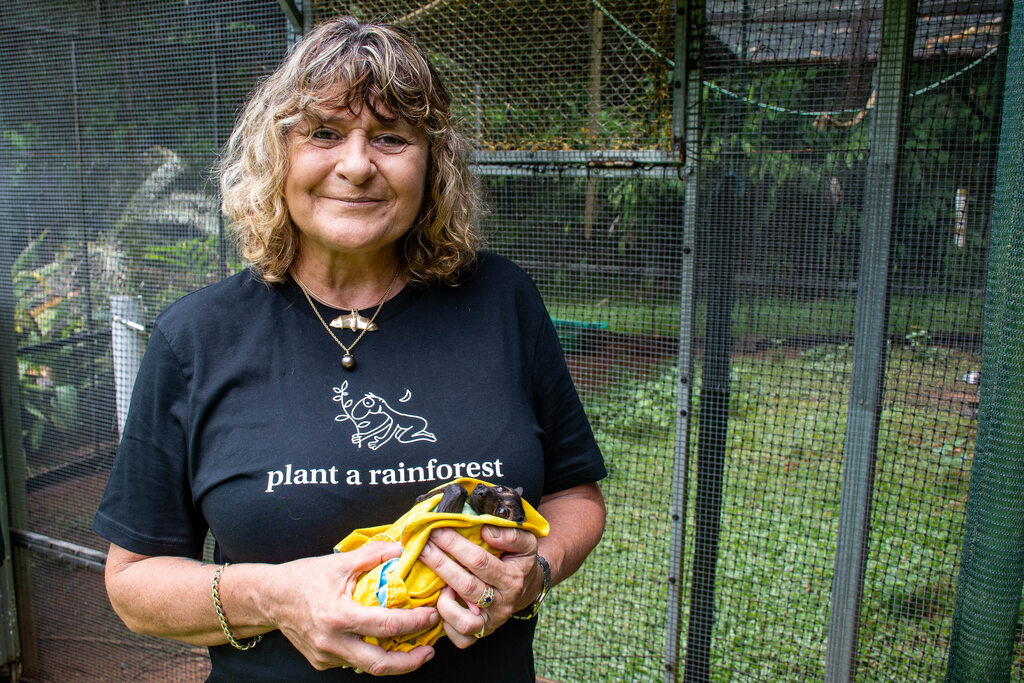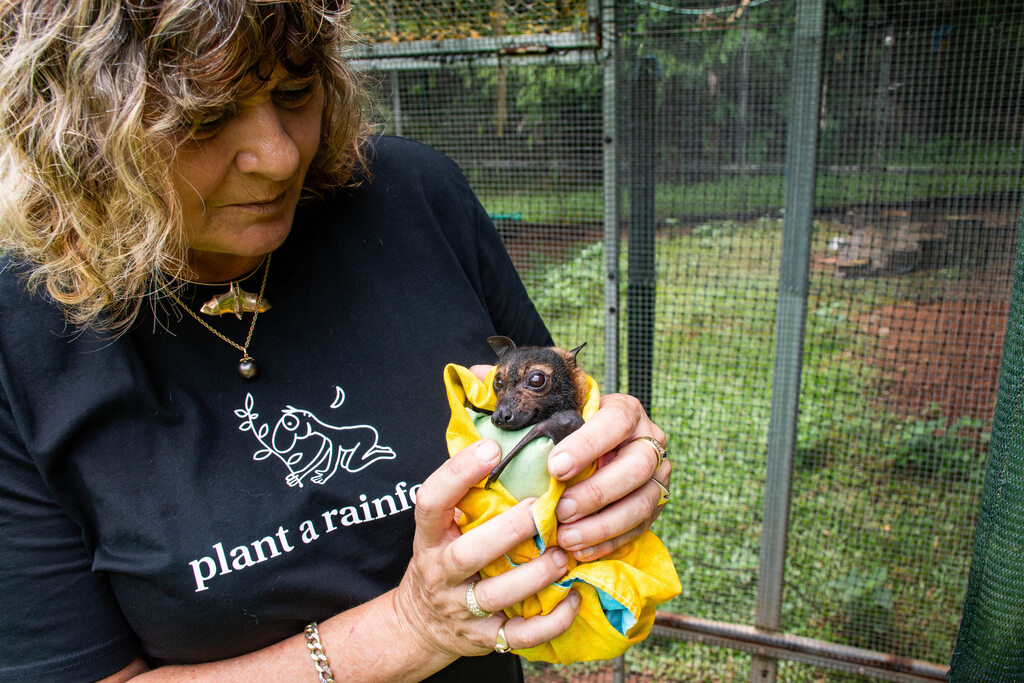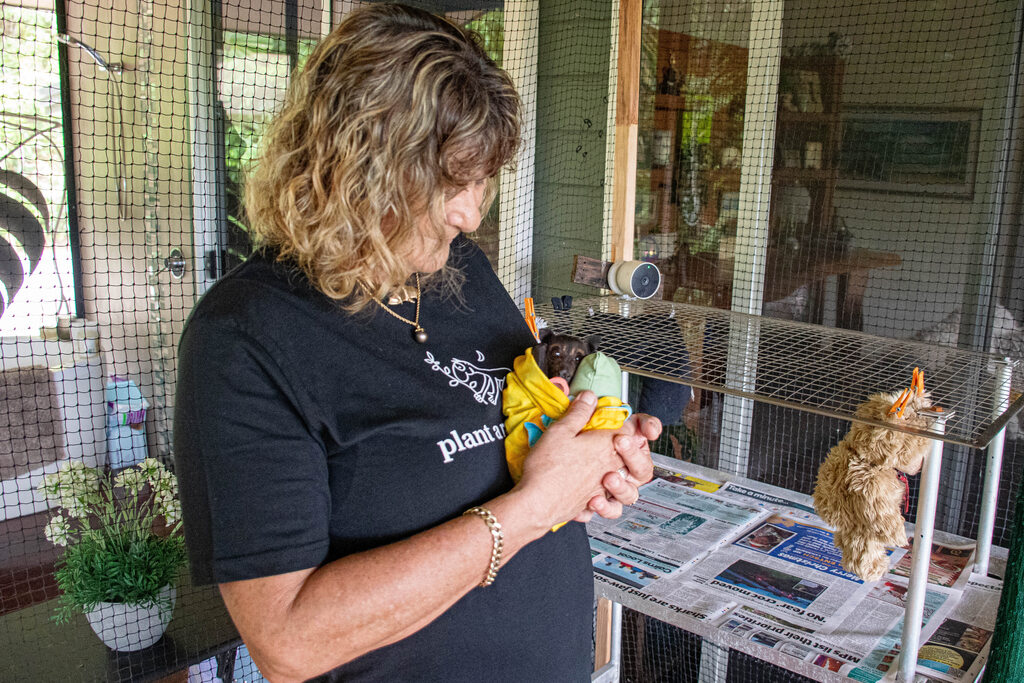The woman behind Wonga Beach’s flying-fox sanctuary and rainforest revival
Annie Schoenberger, a dedicated conservationist and wildlife carer – and the woman behind Wonga Beach’s flying-fox sanctuary and rainforest revival – has transformed her property near Wonga Beach into the NightWings Rainforest Centre, a sanctuary for rescued flying-foxes and a thriving rainforest. Over the past decade, with the help of Rainforest Rescue, she has planted over 178,000 native trees, restoring 18 hectares of land to its natural rainforest state. Annie’s efforts have not only provided a refuge for various wildlife species but have also contributed to the regeneration of the local ecosystem.

Annie Schoenberger with flying fox pup Pixel in front of the dedicated bat enclosure on her property. Picture: Jamie Jansen, Newsport
Nestled near Wonga Beach, Nightwings Rainforest Centre is the creation of passionate conservationist and wildlife carer Annie Schoenberger. She has built a sanctuary for rescued flying-foxes while working to restore her property – once cane farmland – back into thriving rainforest.
Annie’s mission is clear: to create a wildlife corridor where native species could thrive and reclaim their natural habitat.
Together with her partner Steve, she has joined with Rainforest Rescue to bring this vision to life, transforming their 40-hectare property back into the lush lowland rainforest it once was before clearing.
This year marks their 10th year of tree planting, with over 178,000 native trees already carefully selected and planted over 18 hectares to support and rejuvenate the local ecosystem.

Annie has created a cosy balcony nursery where young bats sleep safely at night. Picture: Jamie Jansen, Newsport
Within her home, Annie has also established a dedicated sanctuary where she has cared for and rehabilitated more than 300 injured bats, including the flying foxes native to our region, across the past 13 years.
Many of these orphaned pups arrive after losing their mothers to electrocution, dog attacks, malnourishment, tick bites, car strikes or getting stuck in barbed wire.
When a baby bat arrives, Annie carefully assesses their health, hydration, and weight to determine their milk needs.
“During those first few days, they need a lot of TLC,” she explained. “They miss their mothers deeply, and it can be distressing.”
At the time of the interview, Annie is caring for two flying fox pups, Puzzle and Pixel. Puzzle hangs calmly upside down on Annie’s shirt, unbothered by her surroundings, while Pixel snoozes on her lap, snugly wrapped in a blanket.
Both bats were rescued from a Port Douglas colony. Pixel was found in a tree, calling for her mother, who had died. Local Coconut Phil rescued her with his cherry picker. Another pup was later found on a footpath and brought to Annie by Port Douglas Wildlife Rescue.
“They need to be around 400 grams and six to eight months old before returning to the wild,” Annie explained.
Some of the bats Annie has released still return to her property, which has become a refuge not only for flying-foxes but also for cassowaries, birds, echidnas, and striped possums.
“It’s a lot of work, but seeing these animals thrive makes it all worth it,” she said.
Keystone species
Besides rescuing them, Annie is on a mission to raise awareness about the vital role flying foxes play in our ecosystem.
“I love flying-foxes, and it breaks my heart to see their habitat disappearing due to development and climate change,” Annie shares.
“Their noise often frustrates people, leading to harmful dispersals, but as keystone species, flying-foxes are essential pollinators and seed dispersers, helping forests regenerate. Without them, entire ecosystems would be at risk.
“Overcoming misconceptions is critical. Bats are not dirty or disease-ridden. Lyssavirus can only be transmitted through saliva via bites or scratches, it doesn’t survive in the air or droppings.
“I’m vaccinated, but the right thing to do is to never touch a bat. If you find one in need, call Port Douglas Wildlife Rescue or Far North Queensland Wildlife Rescue immediately.”
Annie’s vision for the future is clear: “I hope this place remains a paradise where nature and humans thrive together. We must remember why we love it here and protect it for future generations.”
If you find an injured bat you can contact Annie on 0417 993 397.

Many orphaned pups arrive at Annie’s care after losing their mothers to electrocution, dog attacks, malnourishment, tick bites, or car strikes. Picture: Jamie Jansen, Newsport
![]()
This article, “The woman behind Wonga Beach’s flying-fox sanctuary and rainforest revival,” was originally published on January 10, 2025, by Jamie Jansen for Douglas Shire News Newsport. You can read the full article here.
Rainforest Rescue’s 2025 Annual Community Tree Planting Day at NightWings is scheduled for Saturday 17 May 2025 and you’re invited! This will mark the end of an era as we plant out the final plot at NightWings Rainforest Centre. Join us!
Want more good Rainforest news in your life?
Subscribe to our eNews | Follow us on Instagram | Like us on Facebook | Subscribe to our YouTube channel
Help Protect Rainforests Forever
Donate to Protect Rainforests Forever | Become a Rainforest Guardian for as little as $2 a month | Partnership Options

